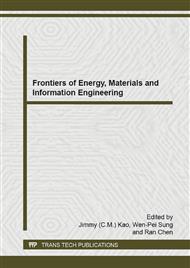p.490
p.495
p.503
p.507
p.515
p.523
p.527
p.532
p.536
The Comprehensive Assessment of Power Quality Based on Attribute Recognition Theory and AHP Algorithm
Abstract:
It is the direction of the future development of the electricity market to assess power quality and determine the tariff in accordance with the power quality. This paper established attribute recognition theoretical model, and determined the weight of each evaluation index of power quality based on Analytic Hierarchy Process (AHP) algorithm, and proposed the comprehensive assessment of power quality based on attribute recognition theory and AHP algorithm. Even considering various impact factors of steady state and transient state, this algorithm is able to avoid the subjectivity affecting the evaluation results for power assessment index weight, ensuring the fairness of the assessment. The results show that this algorithm is much more effective than the fuzzy comprehensive evaluation method in differentiating the level of power quality, and thus to ensure the fairness of evaluation results.
Info:
Periodical:
Pages:
515-522
Citation:
Online since:
October 2014
Authors:
Keywords:
Price:
Сopyright:
© 2014 Trans Tech Publications Ltd. All Rights Reserved
Share:
Citation:


